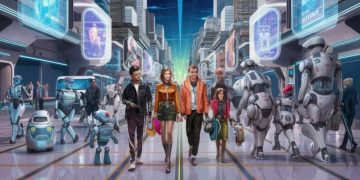Future-Proof Your Career: Top 3 Skills for US Workforce

Future-proofing your career in the evolving US workforce requires focusing on adaptable skills like continuous learning, digital literacy, and complex problem-solving to navigate technological advancements and changing job market demands.
In today’s rapidly changing job market, it’s crucial to **future-proof your career**. The US workforce is constantly evolving, driven by technological advancements and shifting economic landscapes. To thrive in this environment, professionals need more than just traditional qualifications. They require a specific set of adaptable skills that can withstand the test of time. Let’s explore three skills essential for the evolving US workforce.
The Importance of Continuous Learning
Continuous learning is no longer an option; it’s a necessity. The half-life of skills is shrinking, meaning the knowledge we possess today becomes obsolete much faster than it did in the past. To remain relevant and competitive, professionals must embrace a mindset of lifelong learning.
Why Continuous Learning Matters
The job market is becoming increasingly dynamic, with new roles and industries emerging regularly. Continuous learning allows individuals to adapt to these changes and acquire the necessary skills to succeed.
Technological advancements are transforming the way we work. From artificial intelligence to automation, new technologies are constantly reshaping job roles and responsibilities. Continuous learning enables professionals to stay ahead of the curve and leverage these technologies effectively.
- Stay Updated: Keeps you informed about the latest industry trends and best practices.
- Enhance Skills: Helps you develop new skills and improve existing ones.
- Boost Confidence: Increases your confidence in your ability to handle new challenges.
- Increase Employability: Makes you a more attractive candidate to employers.

Continuous learning isn’t just about formal education. It encompasses a wide range of activities, from attending webinars and conferences to reading industry publications and experimenting with new tools. The key is to be proactive and intentional about your learning journey.
As a result, professionals who prioritize continuous learning are better positioned to navigate the uncertainties of the modern workplace and capitalize on emerging opportunities. They are more adaptable, resourceful, and resilient in the face of change.
Digital Literacy: Navigating the Digital Landscape
In an increasingly digital world, digital literacy is a fundamental skill for virtually every profession. It’s about more than just knowing how to use a computer; it’s about understanding how to navigate, evaluate, and utilize digital information and tools effectively.
Understanding Digital Literacy
Digital literacy encompasses a range of skills, including the ability to find and evaluate information online, communicate and collaborate using digital tools, and understand the ethical and social implications of technology. These skills are essential for both personal and professional success.
Digital literacy also involves understanding the basics of cybersecurity and online privacy. With the increasing prevalence of cyber threats and data breaches, it’s more important than ever for individuals to protect their personal and professional information online.
- Information Evaluation: Assessing the credibility and reliability of online sources.
- Communication Skills: Effectively communicating and collaborating through digital platforms.
- Cybersecurity Awareness: Understanding and mitigating online security risks.
- Data Privacy: Protecting personal and professional data in the digital realm.
The rise of remote work and virtual collaboration has further amplified the importance of digital literacy. Professionals must be able to use digital tools to communicate with colleagues, manage projects, and deliver results, regardless of their physical location.
Ultimately, digital literacy is about empowering individuals to thrive in the digital age. By developing these skills, professionals can unlock new opportunities, overcome challenges, and contribute to a more connected and informed society.
Complex Problem-Solving: Tackling Unstructured Challenges
As the world becomes more complex, the ability to solve complex problems is becoming increasingly valuable. Unlike routine tasks that can be automated or outsourced, complex problem-solving requires critical thinking, creativity, and collaboration.
Why Complex Problem-Solving Matters
Complex problems are characterized by ambiguity, uncertainty, and multiple stakeholders. They often involve conflicting goals and constraints, making them difficult to define and resolve. Professionals who excel at complex problem-solving can navigate these challenges and develop innovative solutions.
Effective problem-solvers are adept at breaking down complex problems into smaller, more manageable components. They can identify the root causes of problems, generate creative solutions, and evaluate the potential consequences of each option.

- Critical Thinking: Analyzing information objectively and identifying logical fallacies.
- Creative Thinking: Generating novel and innovative solutions to challenges.
- Collaboration: Working effectively with others to achieve shared goals.
- Decision-Making: Evaluating options and making informed choices.
Complex problem-solving isn’t just about finding the right answer; it’s also about asking the right questions. Effective problem-solvers are curious and inquisitive, always seeking to understand the underlying causes and dynamics of a problem.
In conclusion, professionals who possess strong complex problem-solving skills are highly sought after by employers across a wide range of industries. They are able to tackle the most challenging problems, drive innovation, and create value for their organizations.
Leveraging Technology for Skill Enhancement
Technology provides unprecedented opportunities for skill enhancement. Online courses, virtual reality simulations, and AI-powered learning platforms offer personalized and immersive learning experiences that can accelerate skill development.
Utilizing Online Learning Platforms
Online learning platforms like Coursera, edX, and Udacity offer a vast catalog of courses, certifications, and degrees from top universities and institutions around the world. These platforms provide flexible and affordable access to high-quality education.
Many online courses also offer opportunities for interactive learning, such as discussion forums, group projects, and live Q&A sessions with instructors. These features can enhance engagement and facilitate meaningful learning experiences.
Professionals can also leverage virtual reality (VR) and augmented reality (AR) technologies to simulate real-world scenarios and practice skills in a safe and controlled environment. VR simulations can be particularly useful for developing skills in high-risk or complex environments.
Ultimately, technology is a powerful tool for skill enhancement. By leveraging online learning platforms, VR simulations, and AI-powered learning tools, professionals can accelerate their skill development and stay ahead of the curve.
The Role of Mentorship and Networking
Mentorship and networking play a crucial role in career development. Mentors provide guidance, support, and encouragement, while networking connects professionals with opportunities and resources. Both are essential for navigating the complexities of the modern workplace.
Finding a Mentor
A mentor can provide valuable insights, advice, and feedback based on their own experiences. Mentors can help professionals identify their strengths and weaknesses, set goals, and develop strategies for achieving success.
Networking can open doors to new opportunities, provide access to valuable information, and connect professionals with like-minded individuals. Networking events, industry conferences, and online communities are all great ways to expand your network.
In summary, mentorship and networking are powerful tools for career development. By finding a mentor and building a strong professional network, professionals can gain the support, guidance, and resources they need to succeed.
Building a Future-Proof Mindset
Ultimately, future-proofing your career requires more than just acquiring specific skills; it requires cultivating a future-proof mindset. This involves embracing change, being adaptable, and continuously learning and growing.
Adopting a Growth Mindset
A growth mindset is the belief that abilities and intelligence can be developed through dedication and hard work. Individuals with a growth mindset embrace challenges, persist through setbacks, and view failure as an opportunity for learning.
Future-proofing your career requires a proactive approach. Instead of waiting for change to happen, anticipate it and prepare accordingly. This involves staying informed about industry trends, identifying emerging technologies, and developing the skills needed to adapt to new challenges.
In conclusion, building a future-proof mindset is essential for navigating the uncertainties of the modern workplace. By embracing change, being adaptable, and continuously learning and growing, professionals can thrive in any environment.
| Key Point | Brief Description |
|---|---|
| 👨🎓 Continuous Learning | Staying updated with industry trends and developing new skills. |
| 💻 Digital Literacy | Navigating, evaluating, and utilizing digital information and tools effectively. |
| 🤔 Complex Problem-Solving | Tackling unstructured challenges with critical and creative thinking. |
| 🤝 Mentorship & Networking | Gaining guidance and connecting with opportunities for career growth. |
FAQ
▼
Continuous learning ensures workers remain relevant and adaptable in a job market rapidly evolving due to technological advancements and changing industry demands, preventing skill obsolescence.
▼
Digital literacy enables professionals to effectively navigate digital tools and information, crucial for communication, collaboration, and problem-solving in today’s tech-driven workplaces.
▼
Strong problem-solving skills empower US workers to tackle complex, unstructured challenges, fostering innovation, and maintaining a competitive edge in the global market.
▼
Mentors offer invaluable guidance and support based on experience, while networking opens doors to opportunities, industry insights, and valuable professional connections accelerating career growth.
▼
Technology offers online courses, VR simulations, and AI platforms that personalize learning, making skill development more accessible, efficient, and tailored to individual needs.
Conclusion
In conclusion, the evolving US workforce requires a proactive approach to career development. By prioritizing continuous learning, enhancing digital literacy, and sharpening complex problem-solving skills, professionals can future-proof their careers and thrive in the face of change.





